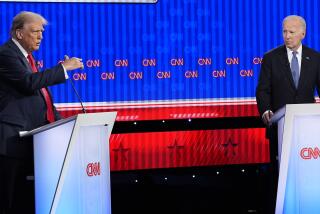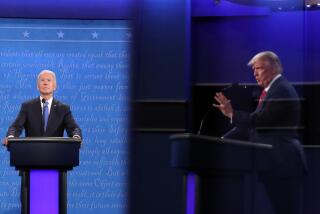Candidates Go On Attack in Debate
- Share via
MANCHESTER, N.H. — The top contenders for the Republican presidential nomination turned on each other with talons bared here Thursday night as a televised candidate debate turned in some of the sharpest exchanges of the 1996 campaign.
Former Tennessee Gov. Lamar Alexander and TV commentator Patrick J. Buchanan ganged up on front-running Sen. Bob Dole, accusing him of distorting their records and running a divisive and negative campaign.
In his opening statement, Alexander charged that Dole was running false advertising aimed at Buchanan and himself and demanded that Dole pull them off the air.
Buchanan accused Dole of conducting a hostile phone bank operation aimed at undermining Buchanan’s campaign and said his rival had passed the bounds of political propriety by branding him an “extremist.”
“Bob, it’s not true,” Buchanan said, turning to his right to look directly at the Senate majority leader. “Pat Buchanan is not an extremist. Those are the cuss words of the establishment.”
“Bob Dole is a better man than the campaign his folks are running,” Buchanan said, adding that Dole was “pirating my message and parroting my rhetoric” in order to slow Buchanan’s progress among disaffected, lower-income voters.
Dole initially refused to be baited, hewing closely to his scripted plan to talk about a balanced budget, welfare reform and the need to elect a Republican president to complete the overhaul of the federal government envisioned by the new Republican majority in Congress.
But his restraint only lasted so long. First, Dole accused Alexander of initiating the campaign of negative TV advertising last year with an attack on California Gov. Pete Wilson during Wilson’s stint as a candidate.
“I didn’t know anything about negative advertising until I saw you do it against Pete Wilson,” Dole said, maintaining a tight-mouthed smile.
Later, he turned on Steve Forbes, complaining that Forbes had “pounded” him with negative advertising.
“You’ve got a lot of money. You want to buy this election,” Dole said. “But this election’s not for sale.”
For his part, Forbes began by refraining from personal attacks on his rivals, choosing instead to paint a more positive picture of his campaign program after weeks of an expensive and highly negative advertising campaign.
“Before you decide who you believe in, you have to decide who you believe,” Forbes said, addressing himself directly to the television audience. He said that he supports not only a flat tax, but a return of control of education to parents, greater choice for Medicare recipients and alternatives to the mandatory Social Security contribution system.
“Politicians may talk about such issues but I’ve shown what to do about them,” Forbes said.
But later in the debate, in response to a question about negative advertising, Forbes slammed Alexander for his personal business dealings, pointing to one transaction--an option to purchase a Nashville newspaper--in which Alexander gained more than $600,000 after putting up almost no money of his own.
Gibing at Alexander’s campaign slogan--”ABC: Alexander Beats Clinton”--Forbes quipped that Alexander really meant to compare himself not to the president, but to Hillary Rodham Clinton and her large gains from trading cattle futures.
“The reason everyone knows about that is I’ve disclosed my tax returns,” Alexander said when his turn came to respond, demanding that Forbes do likewise.
Thursday’s debate, sponsored by New Hampshire television station WMUR and CNN, provided more contention and confrontation than any of the previous, tightly controlled debate formats. Opening statements were brief and the leading candidates used them to try to weaken their opponents rather than giving abbreviated versions of their stump speeches.
With the crucial New Hampshire primary only five days away, Dole, Buchanan and Alexander were clearly jockeying for advantage among the large body of undecided New Hampshire voters. As the debate neared, several new polls showed a tight race, with Dole and Buchanan apparently vying for the lead while Alexander and Forbes fight for third. The polls, however, also showed Buchanan’s standing rising in recent days and Forbes falling.
The debate provided an opportunity for all of the leading candidates to address clear tasks confronting them. Dole needed to strengthen his grip on the status of front-runner, seriously mangled by a slim victory in Monday’s Iowa caucuses and by relentless pounding by Forbes and Buchanan. Buchanan had to show that his religiously conservative and populist message can be tailored to fit New Hampshire’s economy-minded electorate as well as it did Iowa’s social conservatives; he may also have to deflect news stories linking a top advisor to a white supremacist organization.
Alexander, meanwhile, had to put substantive meat on the bones of his “none of the above” candidacy, which so far seems to be thriving on the fact that voters find less to dislike about him than about his rivals. Until now, however, Alexander has offered little in the way of prescriptions for the nation’s ills.
* RELATED STORY: A5
More to Read
Get the L.A. Times Politics newsletter
Deeply reported insights into legislation, politics and policy from Sacramento, Washington and beyond. In your inbox twice per week.
You may occasionally receive promotional content from the Los Angeles Times.









